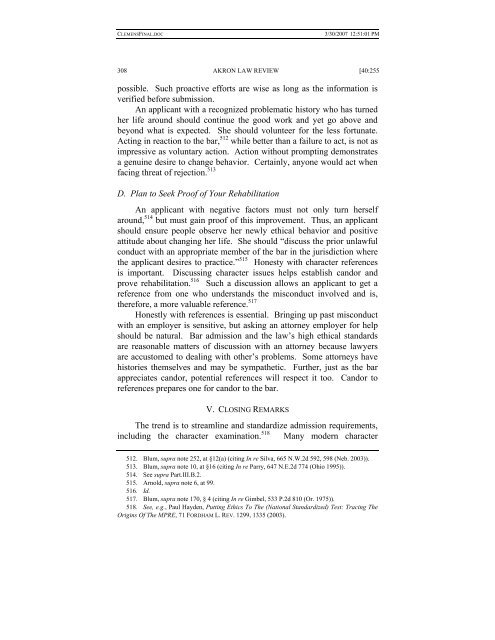Facing the Klieg Lights: Understanding the "Good Moral Character"
Facing the Klieg Lights: Understanding the "Good Moral Character"
Facing the Klieg Lights: Understanding the "Good Moral Character"
Create successful ePaper yourself
Turn your PDF publications into a flip-book with our unique Google optimized e-Paper software.
CLEMENSFINAL.DOC<br />
3/30/2007 12:51:01 PM<br />
308 AKRON LAW REVIEW [40:255<br />
possible. Such proactive efforts are wise as long as <strong>the</strong> information is<br />
verified before submission.<br />
An applicant with a recognized problematic history who has turned<br />
her life around should continue <strong>the</strong> good work and yet go above and<br />
beyond what is expected. She should volunteer for <strong>the</strong> less fortunate.<br />
Acting in reaction to <strong>the</strong> bar, 512 while better than a failure to act, is not as<br />
impressive as voluntary action. Action without prompting demonstrates<br />
a genuine desire to change behavior. Certainly, anyone would act when<br />
facing threat of rejection. 513<br />
D. Plan to Seek Proof of Your Rehabilitation<br />
An applicant with negative factors must not only turn herself<br />
around, 514 but must gain proof of this improvement. Thus, an applicant<br />
should ensure people observe her newly ethical behavior and positive<br />
attitude about changing her life. She should “discuss <strong>the</strong> prior unlawful<br />
conduct with an appropriate member of <strong>the</strong> bar in <strong>the</strong> jurisdiction where<br />
<strong>the</strong> applicant desires to practice.” 515 Honesty with character references<br />
is important. Discussing character issues helps establish candor and<br />
prove rehabilitation. 516 Such a discussion allows an applicant to get a<br />
reference from one who understands <strong>the</strong> misconduct involved and is,<br />
<strong>the</strong>refore, a more valuable reference. 517<br />
Honestly with references is essential. Bringing up past misconduct<br />
with an employer is sensitive, but asking an attorney employer for help<br />
should be natural. Bar admission and <strong>the</strong> law’s high ethical standards<br />
are reasonable matters of discussion with an attorney because lawyers<br />
are accustomed to dealing with o<strong>the</strong>r’s problems. Some attorneys have<br />
histories <strong>the</strong>mselves and may be sympa<strong>the</strong>tic. Fur<strong>the</strong>r, just as <strong>the</strong> bar<br />
appreciates candor, potential references will respect it too. Candor to<br />
references prepares one for candor to <strong>the</strong> bar.<br />
V. CLOSING REMARKS<br />
The trend is to streamline and standardize admission requirements,<br />
including <strong>the</strong> character examination. 518 Many modern character<br />
512. Blum, supra note 252, at §12(a) (citing In re Silva, 665 N.W.2d 592, 598 (Neb. 2003)).<br />
513. Blum, supra note 10, at §16 (citing In re Parry, 647 N.E.2d 774 (Ohio 1995)).<br />
514. See supra Part.III.B.2.<br />
515. Arnold, supra note 6, at 99.<br />
516. Id.<br />
517. Blum, supra note 170, § 4 (citing In re Gimbel, 533 P.2d 810 (Or. 1975)).<br />
518. See, e.g., Paul Hayden, Putting Ethics To The (National Standardized) Test: Tracing The<br />
Origins Of The MPRE, 71 FORDHAM L. REV. 1299, 1335 (2003).
















